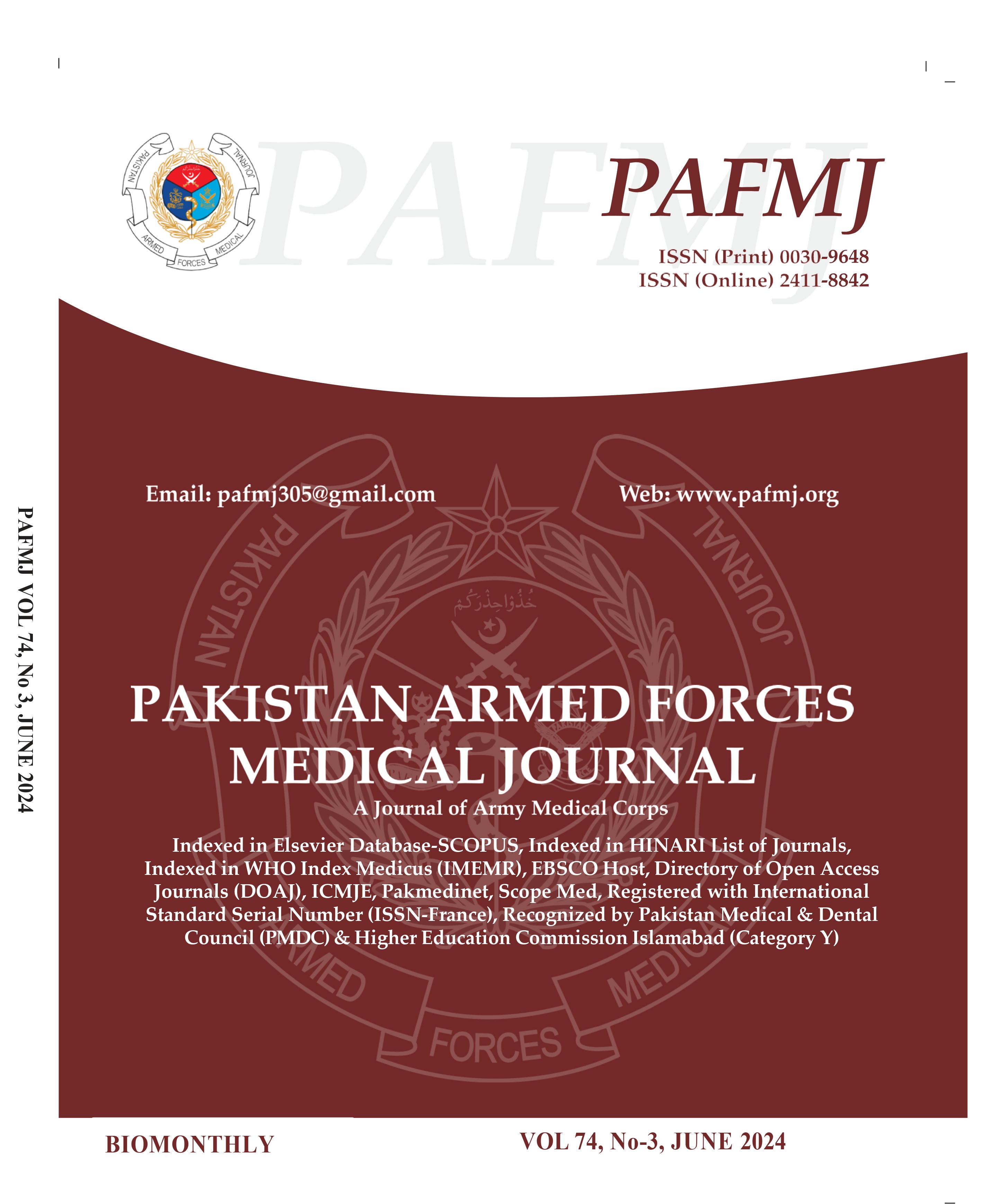Transcatheter Cardiac Interventions in Neonates with Congenital Heart Disease: A Single Centre Experience
DOI:
https://doi.org/10.51253/pafmj.v74i3.7158Keywords:
Atria, Echocardiography, Newborn, Transcatheter.Abstract
Objective: To analyze the outcome among neonates undergoing transcatheter balloon atrial septostomy for various kinds of congenital heart diseases.
Study Design: Prospective longitudinal study.
Place and Duration of Study: National Institute of Cardiovascular Diseases, Karachi Pakistan, from Feb 2020 to May 2021.
Methodology: A total of 28 neonates of both genders with echocardiography proven diagnosis of Tricuspid Atresia with restrictive Patent Foramen Ovale, Dextro-Transposition of Great Arteries with Intact Ventricular Septum, complex cyanotic congenital heart disease with inadequate mixing or hypoplastic left heart syndrome with restrictive PFO and a non-significant Patent Ductus Arteriosus, undergoing transcatheter balloon atrial septostomy were included. Demographic data along with diagnosis, clinical presentation, echocardiographic findings, procedural outcome (successful/unsuccessful), duration of the procedure, complication (if any), post-procedural echocardiographic findings, duration of hospital stay, further treatment plan and 3-months follow up outcomes were recorded among all neonates.
Results: Most common diagnosis was Dextro-Transposition of the Great Arteries with IVS observed in 14(50.0%) neonates. Procedural outcome was found to be successful among 23(82.1%) neonates. There were 19(67.9%) neonates who did not show any post-procedure complication. At 3-months follow up, improvement in blood saturation and weight gain were reported among 12(42.9%) neonates each. Overall, mortality was noted in 7(25.0%) neonates, of whom 4(57.1%) neonates were having hypoplastic left heart syndrome.
Conclusion: Transcatheter atrial septostomy done in neonatal period was found to have positive outcomes. Mortality remains high among neonates undergoing transcatheter atrial septostomy having hypoplastic left heart syndrome.
Downloads
References
Gundogdu Z, Babaoglu K, Deveci M, Tugral O, Zs U. A Study of Mortality in Cardiac Patients in a Pediatric Intensive Care Unit. Cureus 2019; 11(11): e6052.
https://doi.org/10.7759/cureus.6052
Latal B. Neurodevelopmental outcomes of the child with congenital heart disease. Clin Perinatol 2016; 43: 173-185.
https://doi.org/10.1016/j.clp.2015.11.012
Rizvi SF, Mustafa G, Kundi A, Khan MA. Prevalence of congenital heart disease in rural communities of Pakistan. J Ayub Med Coll Abbottabad. 2015; 27(1): 124-127.
Lawn JE, Cousens S and Zupan J. 4 million neonatal deaths: when? where? why? Lancet
; 365(9462): 891–900.
https://doi.org/10.1016/S0140-6736(05)71048-5
Changlani TD, Jose A, Sudhakar A, Rojal R, Kunjikutty R, Vaidyanathan B. Outcomes of infants with prenatally diagnosed congenital heart disease delivered in a tertiary-care pediatric cardiac facility. Indian Pediatr 2015; 52(10): 852–856.
https://doi.org/10.1007/s13312-015-0731-x
Colaco SM, Karande T, Bobhate PR, Jiyani R, Rao SG, Kulkarni S. Neonates with critical congenital heart defects: Impact of fetal diagnosis on immediate and short-term outcomes. Ann Pediatr Cardiol 2017; 10(2): 126–130.
https://doi.org/10.4103/apc.APC_125_16
Kerneis M, Nafee T, Yee MK, Kazmi HA, Datta S, Zeitouni M, et al. Most Promising Therapies in Interventional Cardiology. Curr Cardiol Rep 2019; 21(4): 26.
https://doi.org/10.1007/s11886-019-1108-x
Krishna MR, Kumar RK. Diagnosis and Management of Critical Congenital Heart Diseases in the Newborn. Indian J Pediatr 2020; 87(5): 365-371. https://doi.org/10.1007/s12098-019-031634
Grigorios T, Stefanos D, Athanasios M, Koniari I, Armylagos S, Davlouros P, et al. Transcatheter versus surgical aortic valve replacement in severe, symptomatic aortic stenosis. J Geriatr Cardiol 2018; 15(1): 76-85.
https://doi.org/10.11909/j.issn.1671-5411.2018.01.002
Larsen SH, Olsen M, Emmertsen K, Hjortdal VE. Interventional Treatment of Patients With Congenital Heart Disease: Nationwide Danish Experience Over 39 Years. J Am Coll Cardiol 2017; 69(22): 2725-2732.
https://doi.org/10.1016/j.jacc.2017.03.587
Melekoglu AN, Baspinar O. Transcatheter cardiac interventions in neonates with congenital heart disease: A single centre experience. J Int Med Res 2019; 47(2): 615-625.
https://doi.org/10.1177/0300060518806111
Vitiello R, McCrindle BW, Nykanen D, Freedom RM, Benson LN. Complications associated with pediatric cardiac catheterization. J Am Coll Cardiol 1998; 32(5): 1433-40.
https://doi.org/10.1016/s0735-1097(98)00396-9
Karagöz T, Akın A, Aykan HH, Çeliker A, Alehan D, Özer S, et al. Interventional cardiac catheterization in infants weighing less than 2500 g. Turk J Pediatr 2015; 57(2): 136-140.
Sachdeva S, Shakya S, Kothari SS. Thrombus in transit after balloon atrial septostomy. Ann Pediatr Cardiol 2020; 13(4): 371-372. https://doi.org/10.4103/apc.APC_172_19
Vlahos AP, Lock JE, McElhinney DB, van der Velde ME. Hypoplastic left heart syndrome with intact or highly restrictive atrial septum: outcome after neonatal transcatheter atrial septostomy. Circulation 2004; 109(19): 2326-2330.
https://doi.org/10.1161/01.CIR.0000128690.35860.C5
Moszura T, Góreczny S, Dryżek P. Hypoplastic left heart syndrome - a review of supportive percutaneous treatment. Postepy Kardiol Interwencyjnej 2014; 10(3): 201-208.
https://doi.org/10.5114/pwki.2014.45148
Holzer RJ, Wood A, Chisolm JL, Hill SL, Phillips A, Galantowicz M, et al. Atrial septal interventions in patients with hypoplastic left heart syndrome. Catheter Cardiovasc Interv 2008; 72(5): 696-704. https://doi.org/10.1002/ccd.21673
Al Maluli H, DeStephan CM, Alvarez RJ Jr, Sandoval J. Atrial Septostomy: A Contemporary Review. Clin Cardiol 2015; 38(6): 395-400. https://doi.org/10.1002/clc.22398
Downloads
Published
Issue
Section
License
Copyright (c) 2024 Fazal ur Rehman, Muhammad Talal Arshad, Mujeeb ur Rehman, Shakeel Ahmed, Abdul Sattar Shaikh, Veena Kumari

This work is licensed under a Creative Commons Attribution-NonCommercial 4.0 International License.















